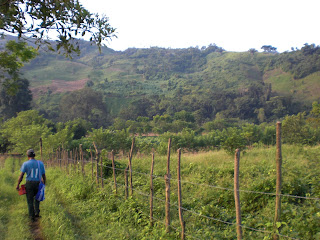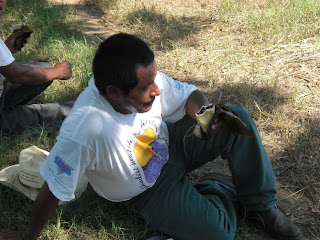The revolution of 1944 had the potential of building a new model for governance. The newly elected government outlawed numerous forms of discrimination, enacted minimum wage and labor conditions laws, and provided land to hundreds of thousands of landless peasants. This was far too much for the US government to allow in a country that had basically been viewed by politicians and major stockholders as a giant plantation. After numerous attempts by the CIA to overthrow the government, President Eisenhower authorized the bombing of the capitol city in 1954. The government quickly collapsed, and the US named a military junta to take its place. Minimum wage laws were scrapped, land was taken back from peasants, voting rights were severed and the majority of accomplishments of the 10 years of democracy (or 10 Years of Spring as they are known in Guatemala) were reversed. The CIA gave the new government a list of tens of thousands of Guatemalans to be ¨neutralized,¨ the School of the Americas (soaw.org) began arming and training the Guatemalan military to torture and kill its own people, and to this day the country has not been able to break free from the grip of the US-backed military.
Meanwhile in the countryside...

I went to plant corn with leaders from the community Papalja. I had only been to the community one other time and it was a brief stop on the way to a hearing in the nearby municipal center of La Tinta. I left with a good impression of the leadership of the community and beauty of the area, so I was very happy when the Committee of Peasant Unity (CUC) asked that one of our upcoming delegations visit Papalja.
Papalja is located in a valley in eastern Guatemala, just north of Lake Izabal. Multinational corporations are targeting this region to clear cut forests and plant African Palm to be used for biodiesel to fuel cars in the US and other wealthy nations. With the help of the government, they are violently evicting Maya Qeqchi communities that have been in the area for generations. Papalja has the rare distinction of possessing a government-recognized title to their land.
 After a prayer for the success of the harvest, we began planting as a group. Community members have private plots, but many work them collectively. Each day they work on a different person`s plot. It was a bittersweet experience for me. I love this manner of sharing work, but my mind kept going back to the last time I participated in a collective corn planting. It was also in the department of Izabal in eastern Guatemala, in the community Suiche III (http://guatemalasolidarityproject.org/suicheiii.htm). The government did not fully recognize Suiche III`s land title. Soon a group of police and private security from the neighboring African Palm plantation came threatening to destroy the corn we had just planted. When I started flashing pictures, their attitude changed somewhat. They said that they really didn`t want to destroy the crops, and that they were going to be nice and wait to get a court order. Months earlier the palm corporation had agreed to recognize the community`s existence, but apparently greed had gotten the better of them. The security personnel asked for Vitelio Mendez, a community leader at Suiche III. Another member of the community raised his hand and said ¨I am Vitelio Mendez.¨ It was an impressive show of solidarity. But the next time I visited the community, Vitelio Mendez was dead. He had been shot by the palm plantation`s private security.
After a prayer for the success of the harvest, we began planting as a group. Community members have private plots, but many work them collectively. Each day they work on a different person`s plot. It was a bittersweet experience for me. I love this manner of sharing work, but my mind kept going back to the last time I participated in a collective corn planting. It was also in the department of Izabal in eastern Guatemala, in the community Suiche III (http://guatemalasolidarityproject.org/suicheiii.htm). The government did not fully recognize Suiche III`s land title. Soon a group of police and private security from the neighboring African Palm plantation came threatening to destroy the corn we had just planted. When I started flashing pictures, their attitude changed somewhat. They said that they really didn`t want to destroy the crops, and that they were going to be nice and wait to get a court order. Months earlier the palm corporation had agreed to recognize the community`s existence, but apparently greed had gotten the better of them. The security personnel asked for Vitelio Mendez, a community leader at Suiche III. Another member of the community raised his hand and said ¨I am Vitelio Mendez.¨ It was an impressive show of solidarity. But the next time I visited the community, Vitelio Mendez was dead. He had been shot by the palm plantation`s private security. We took a break to snack on some tomales made of corn and beans. Community members know they are in a minority for having won recognition from the government of their right to their own land. But this hardly makes them wealthy. Each family has a plot of three acres, enough for their most basic necessities and that`s about it. They had lots of questions about my experience growing fruits and vegetables in the US. When they asked how much land my parents have, I was more than a little embarrassed. ¨Over 200 acres...¨ I said, and tried to change the topic.
We took a break to snack on some tomales made of corn and beans. Community members know they are in a minority for having won recognition from the government of their right to their own land. But this hardly makes them wealthy. Each family has a plot of three acres, enough for their most basic necessities and that`s about it. They had lots of questions about my experience growing fruits and vegetables in the US. When they asked how much land my parents have, I was more than a little embarrassed. ¨Over 200 acres...¨ I said, and tried to change the topic. We went back to Federico`s house and ate a hardy meal. We had worked his plot so he was feeding us, as is the custom. The people of Papalja are not starving. They are not wealthy... but they have gone nearly 10 years without being violently removed from their homes. This has allowed them to build sustainability.
We went back to Federico`s house and ate a hardy meal. We had worked his plot so he was feeding us, as is the custom. The people of Papalja are not starving. They are not wealthy... but they have gone nearly 10 years without being violently removed from their homes. This has allowed them to build sustainability.The majority of Mayan children in Guatemala are malnourished. They are not malnourished because Mayan people are uncivilized, backwards or unintelligent. They are not malnourished because, as many politicians in the US like to claim, they are simply going through the same growing pains that the US went through on the way to development. The majority of Mayan children are malnourished because the US government is arming and training thugs to kill, torture, terrorize and rob from Mayan communities.

This year Papalja opened a new ¨basico¨ school, for the first time giving children access to 7th grade. The community is very proud of this achievement, although numerous challenges remain in their struggle to continue the program and expand it to 9th grade. In the majority of communities that I visit, the cost of attending 7th grade and beyond is prohibitive. (To donate to our education fund, make a check out to ¨UPAVIM Community Development Fund¨ and send it to UPAVIM, c/o Laurie Levinger, 28 McKenna Rd, Norwich, VT 05055. Be sure to write ¨education¨ in the memo section of the check. 100% of funds will be used for school construction, scholarships and purchase of school materials)
The leadership committee of Papalja approved our idea of visiting the community for several days in January. We worked out a draft schedule for the days, focusing on social, cultural and political exchanges between solidarity delegation participants and members of the community. There will be workshops on the importance of organizing, organic agriculture, the School of the Americas and other topics. Workshops will be in Qeqchi, Spanish and English and we will have basic Qeqchi and English language classes. Participants will be able to stay with families in the community or in the school house. If you or someone you know is interested in participating, visit http://guatemalasolidarityproject.org/delegations.htm or email info@guatemalasolidarityproject.org for more info or an application.
No hay comentarios:
Publicar un comentario